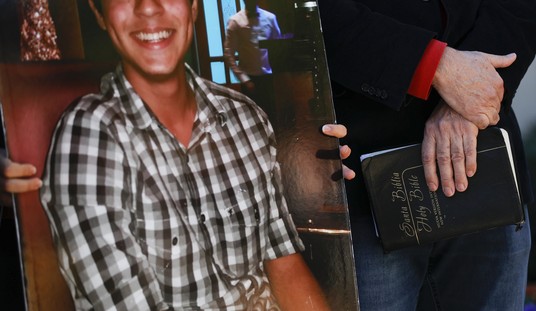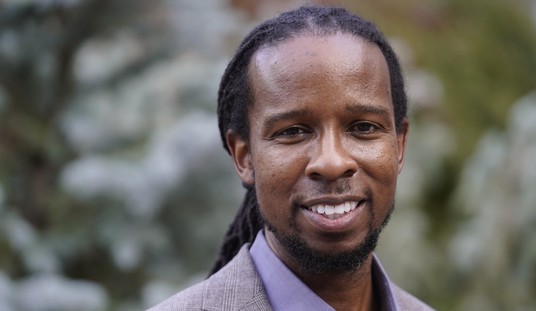This isn’t just a think piece buried in the back of the magazine, either, but a full-fledged cover story from Time’s correspondent in Ukraine. Simon Shuster paints Vladimir Putin as a master manipulator, controlling events in order to make himself and Russia indispensable for addressing crises that Putin largely orchestrates. Note the color of the background in next week’s paper issue:
That’s hardly subtle, either in its attitude toward Putin (which is explicit) or to the West and the Obama administration, which is implicit in the headline. If the West is “losing Putin’s dangerous game,” then that reflects on the leader of the Free World, either directly or indirectly. And in the article, Shuster gets very direct about Barack Obama’s fecklessness in Ukraine and regarding Russia:
As the days passed and the stench rose, the coldly calculating Russian President got his answer: apparently not. While state-controlled media at home buried Russia’s role in the disaster under an avalanche of anti-Western propaganda, leaders in Europe and the U.S. found themselves stymied once again by Putin’s brazenness. Dutch Prime Minister Mark Rutte, whose nation lost 193 citizens in the attack (one of them a U.S.-passport holder) called pitifully on Putin to do “what is expected of him” in helping recover the bodies. U.S. President Barack Obama struck a similar tone on July 21 after the victims’ remains had been packed into refrigerated train cars out of reach of foreign investigators: “Given its direct influence over the separatists, Russia and President Putin in particular has direct responsibility to compel them to cooperate with the investigation. That is the least that they can do.”
That was the crisis in a nutshell: the least Putin could do was the most Obama could ask for. The American President announced no deadlines, drew no red lines and made no threats. Even as U.S. intelligence sources asserted with growing confidence that Russian weapons and Russian allies were behind the missile attack, U.S. diplomats were met with roadblocks as they tried to rally Europe to stiffen sanctions against Putin. Obama and Rutte spoke as leaders without leverage, for their voters aren’t interested in military conflict with Russia or its puppets. A generation of Westerners has grown up in the happy belief that the Cold War ended long ago and peace is Europe’s fated future. They are slow to rally to the chore of once again containing Russia’s ambitions.
The US has not been able to call together a united front with Europe, a situation that Putin has exploited. And that situation has not improved after the MH17 shootdown:
What happens in the aftermath of the MH 17 disaster will test Putin’s assessment of declining American power. The coming days will determine whether the U.S. and Europe can form a united front against a country that virtually the entire world believes handed a loaded weapon to an unregulated militia. “We can’t do this unilaterally,” says a senior official in the Obama Administration. “We’ve got to work with the Europeans on a strategy to help contain Russia.”
So far there’s not much unity on show. Four days after the downing of the airliner, when the bodies of the victims were still stuck in rebel territory, French President François Hollande said France would go ahead with the sale of at least one warship to Russia, the helicopter carrier Mistral, against the direct objections of the U.S. and U.K. “The symbolism is terrible,” the Administration official tells Time on condition of anonymity.
Shuster suggests that a quick resolution of MH17 that firmly establishes responsibility on Russian-backed Ukrainian rebels or Russia itself might galvanize Europe into unity on American terms. That’s debatable, though, since this admission has already been made on the ground in eastern Ukraine:
A Ukrainian militiaman who says he witnessed the downing of Malaysia Flight MH17 gave a vivid interview to Lorenzo Cremonesi of the Italian newspaper Corriere della Sera.
“We shot down a Kiev plane, our superiors told us,” said the pro-Russian rebel, who lived worked locally as a miner before the uprising in eastern Ukraine. “We thought we were looking for bailed-out Ukrainian pilots but instead we found dead civilians … All those poor people with baggage that certainly wasn’t military.” …
The fighter, from the Oplot (stronghold) combat unit, told Cremonesi that he and his colleagues saw “a huge explosion in the sky” and were prepared to fight survivors from “one of the Kiev Fascists’ planes” that they were told had been shot down.
“My men and I were looking for parachutes on the ground and in the trees,” the militiaman said. “All of a sudden, I saw scraps of material in a clearing. Underneath I found the body of a little girl, […] It was awful. That was when I realized it was a civilian plane. Not a military one. And all these dead people were civilians. A heap of burst suitcases confirmed it.”
Will that deter Putin? Not likely, unless Europe and the US unite in tough economic consequences for Putin’s ambitions, and start undermining the basis of his power — support from Russian industrial barons who got rich off of his power. Until then, Cold War II will continue in the same ugly direction as it has for the last several years, even if the current leadership in the West hasn’t recognized it until now.
Glenn “Instapundit” Reynolds underscores the self-delusion of those last several years:
http://www.youtube.com/watch?v=9YV2KQkBhWs
Maybe this administration has finally learned what “geopolitical threat” means.









Join the conversation as a VIP Member